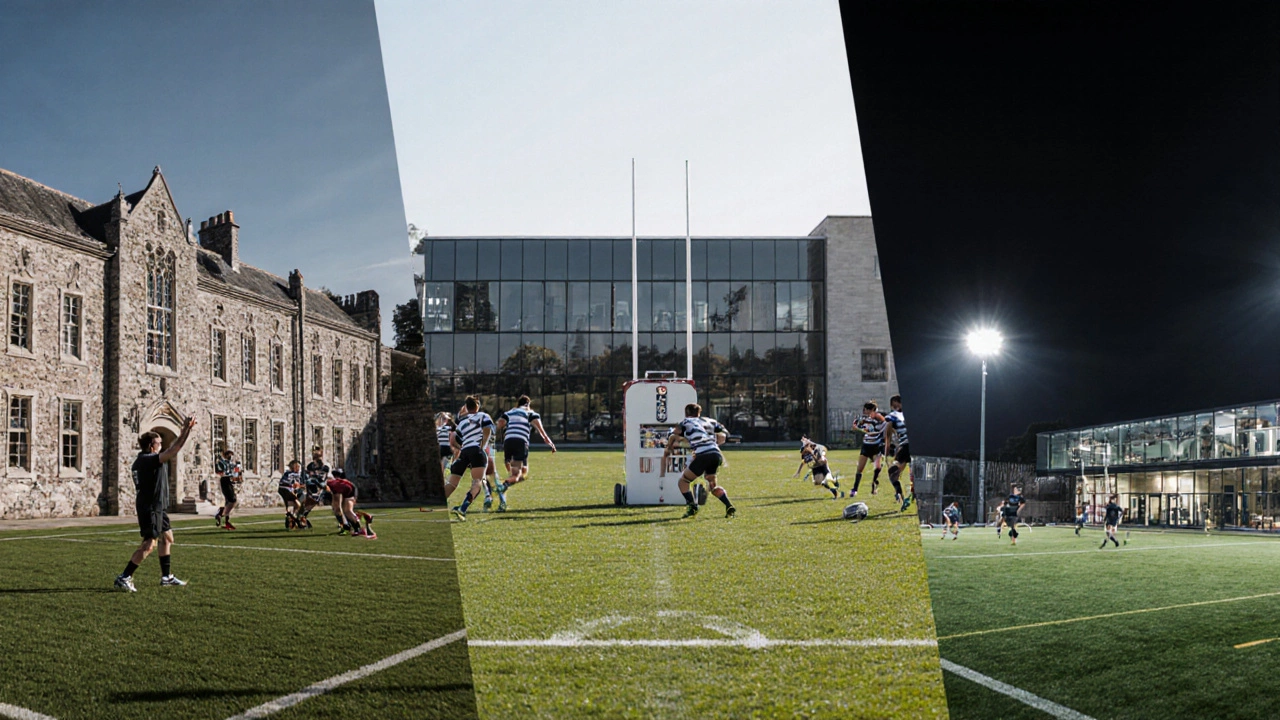Rugby School Finder
Discover which rugby school best matches your priorities. Select your key criteria and we'll show you the schools that align with your goals.
Your Priorities
Select what matters most to you
Matching Schools
Based on your selections, here are the schools that best match your priorities:
When parents, coaches, or aspiring players ask, “What is the best rugby school in the world?”, they’re really looking for a place where talent meets top‑notch coaching, strong academic support, and a track‑record of producing elite athletes. This guide breaks down the criteria, showcases the schools that consistently hit the mark, and gives you a clear roadmap to decide which institution fits your goals.
Quick Takeaways
- Ranking is based on alumni success, competition results, facilities, and coaching depth.
- Nelson College (New Zealand) and GreyHigh School (South Africa) lead the pack.
- Modern success hinges on a blend of sports science, academic flexibility, and international exposure.
- Choosing the right school means matching your development stage with the program’s focus.
- Visit campuses, meet coaches, and review recent player pathways before committing.
Rugby school is an educational institution that combines academic curriculum with high‑performance rugby training, aiming to develop players for professional or representative pathways while ensuring academic qualifications. These schools vary by country, funding model, and competitive level, but they share a common mission: turn raw talent into world‑class athletes.
How We Rank Rugby Schools
To keep the ranking transparent, we assess each school on five core dimensions:
- Alumni pedigree: Number of former students who have played at senior international level or in top professional leagues.
- Competition performance: Recent results in national school championships, regional tournaments, and international school festivals.
- Coaching quality: Credentials of head coaches, staff‑to‑player ratio, and access to sports‑science support.
- Facilities: Quality of pitches (grass vs. artificial), gym equipment, recovery suites, and video analysis rooms.
- Academic support: Flexibility of timetables, tutoring services, and partnership with universities or clubs for scholarships.
Each dimension receives a score out of 20, for a total possible score of 100.

Top Rugby Schools in the World (2025)
1. Nelson College, New Zealand
Founded in 1856, Nelson College blends a historic academic reputation with a modern rugby programme. The school has churned out All Blacks legends such as Sam Cane and Joe Moody. In the past five years, the college has won the National Secondary Schools Championship three times.
- Coaching staff: Head Coach JohnMcCarron, a former New Zealand U20 coach, leads a team of five specialist coaches and a full sports‑science unit.
- Facilities: Two full‑size grass pitches, a climate‑controlled indoor training hall, and a state‑of‑the‑art strength & conditioning centre.
- Academic backing: Partnership with the University of Canterbury offers scholarship pathways for elite players.
2. GreyHigh School, South Africa
Located in Port Elizabeth, GreyHigh is a rugby powerhouse in the Eastern Province. Its alumni list includes Springbok icons like ChesterWilliams and MakazoleMapimpi. The school dominates the Craven Week tournament, clinching the title in 2022 and 2024.
- Coaching staff: Head Coach Mike‑LeeSimmons, a former Springbok flank, runs a program emphasizing skill‑based drills and tactical awareness.
- Facilities: Three hybrid grass pitches, a dedicated scrum machine, and a sports‑medicine clinic.
- Academic flexibility: Customisable timetable for players touring with provincial squads.
3. St.Michael's College, Dublin, Ireland
St.Michael's has emerged as Ireland’s leading rugby school, feeding the national U20 and senior squads. Recent alumni include JamesRyan and CaolinBlade. The team won the Leinster Schools Senior Cup three straight seasons (2022‑2024).
- Coaching staff: Head Coach ConorHickey, former Irish provincial player, incorporates video analysis into weekly sessions.
- Facilities: Two flood‑lit grass pitches, a modern gym, and a high‑tech recovery suite with cryotherapy.
- Academic integration: Strong ties with Trinity College Dublin for scholarship placement.
4. Rugby School, Warwickshire, England
Known as the birthplace of the sport, Rugby School continues to nurture talent through its International Rugby Programme. While not always topping the English Schools Cup, it consistently produces Premiership‑ready players such as TomMorrison (Leicester Tigers).
- Coaching staff: Head Coach JamesDawson, a former England U18 coach, focuses on leadership and game‑intelligence.
- Facilities: Historic grass pitch, a modern indoor arena, and a sports‑performance lab with GPS tracking.
- Academic focus: Offers the International Baccalaureate, allowing student‑athletes to balance global study with elite sport.
5. Grey‑Boys High, Queensland, Australia
Grey‑Boys has risen rapidly in Australian school rugby, winning the Queensland GPS title in 2023 and 2024. Alumni now feature in the Wallabies squad, most notably LachieFisher.
- Coaching staff: Head Coach Sue‑AnneMorris, a former Wallaroos captain, integrates gender‑inclusive training models.
- Facilities: Three all‑weather pitches, a biomechanics lab, and a sports‑psychology wing.
- Academic programme: Flexible study blocks for national team commitments.
Side‑by‑Side Comparison
| School | Country | Alumni in senior internationals | Latest national titles | Coaching staff credentials | Facilities rating (1‑10) | Academic flexibility |
|---|---|---|---|---|---|---|
| Nelson College | New Zealand | 12 | NZ Secondary Champs 2022, 2023, 2024 | Head coach former NZ U20, full sports‑science unit | 9 | University scholarships, flexible timetable |
| GreyHigh School | South Africa | 10 | Craven Week champions 2022, 2024 | Head coach ex‑Springbok, elite conditioning staff | 8 | Customisable schedule for provincial tours |
| St.Michael's College | Ireland | 8 | Leinster Senior Cup 2022‑2024 | Head coach ex‑provincial, video‑analysis focus | 8 | IB programme, scholarship links to Trinity |
| Rugby School | England | 6 | International Rugby Programme finals 2023 | Head coach former England U18, leadership curriculum | 7 | IB and A‑Levels, strong academic reputation |
| Grey‑Boys High | Australia | 5 | Queensland GPS 2023, 2024 | Head coach ex‑Wallaroos captain, inclusive coaching | 8 | Flexible blocks for national team duties |
Choosing the Right School for You
Even with a solid ranking, the “best” choice depends on personal goals, location, and support network. Ask yourself these questions:
- Development stage: Younger players (U14‑U16) benefit from schools with strong fundamentals and academic balance. Older teens need elite pathways and exposure to professional scouts.
- Geographic preference: Relocating abroad can broaden horizons but adds cost and cultural adjustment.
- Financial considerations: Tuition varies widely; many top schools offer scholarships tied to rugby performance.
- Academic priorities: If university admission is a priority, choose a school with recognized curricula (IB, A‑Levels) and strong university links.
- Coach compatibility: Attend a training session if possible. A coach’s style should match your learning preferences (technical vs. tactical focus).
Once you narrow the list, schedule campus visits, meet current players, and request a performance plan that outlines how the school will help you reach senior professional or representative levels.

Common Pitfalls to Avoid
- Chasing prestige only: A famous name doesn’t guarantee personal development. Look for individualized coaching.
- Overlooking academic support: Ignoring school grades can jeopardise scholarship eligibility and post‑rugby career options.
- Neglecting injury prevention resources: Schools lacking physiotherapy or recovery facilities may increase long‑term injury risk.
- Ignoring cultural fit: Moving to a new country without proper support can affect mental health and performance.
Conclusion
While there is no single answer that fits everyone, the schools listed above consistently rank at the top when measured against alumni success, competition results, coaching depth, facilities, and academic flexibility. If you’re after the best rugby school experience, start by matching your personal development goals with the attributes that matter most to you, then visit the campuses that tick those boxes. The right environment will push you to the next level-both on the field and in the classroom.
Frequently Asked Questions
How can I get a scholarship at a top rugby school?
Most elite schools run talent identification days or partner with regional rugby unions. Prepare a strong playing résumé, highlight key statistics (e.g., tries scored, tackles made), and secure a recommendation from your current coach. Early contact-ideally a year before you intend to enrol-gives the admissions team time to assess your suitability and allocate funding.
Do these schools offer education for non‑rugby students?
Yes. While the rugby program receives a lot of attention, all listed schools maintain full academic curricula for the entire student body. Many also provide tutoring and exam prep for athletes who need extra support.
What age groups do these schools accept?
Typically, enrollment starts at Year 9 (around 13‑14 years old) and continues through Year 13. Some institutions, like GreyHigh, also run Junior Development Academies for younger players.
How important is the school’s location for my rugby career?
Location matters if you want exposure to particular professional pathways. For instance, New Zealand schools feed directly into provincial unions that feed the Super Rugby franchises, while English schools have strong ties to Premiership clubs. Decide which professional ecosystem aligns with your long‑term ambitions.
Can I transfer between rugby schools mid‑career?
Transfers are possible but require coordination between the two schools, the relevant rugby union, and often a justification such as a family move or a change in development goals. Early communication with both administrations helps smooth the process.
